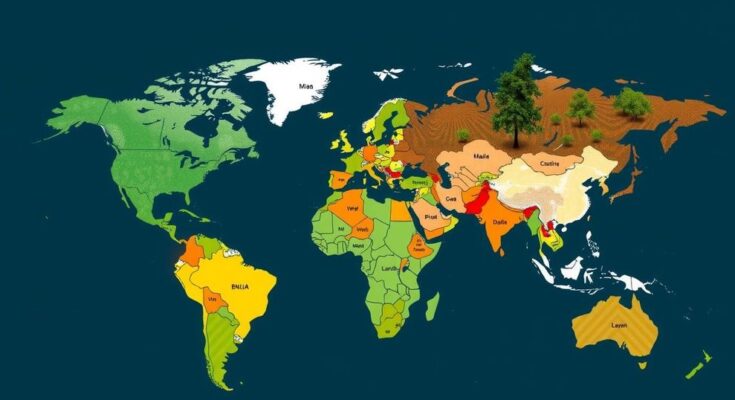Wealthier nations are initiating compensation payments to poorer countries suffering from climate change damages, exemplified by funding that enabled a Malawi farmer, Christopher Bingala, to rebuild after Cyclone Freddy. A total of $720 million has been pledged for loss and damage, but experts warn it is insufficient as climate-related disasters worsen. Negotiations at COP29 are focused on determining financial support for developing nations, as the forecasted need for such funds could reach $250 billion annually by 2030.
As climate change intensifies, wealthier nations are beginning to compensate poorer countries for the damages inflicted by climate disasters. The case of Christopher Bingala, a subsistence farmer in Malawi, illustrates the profound impact of these initiatives. Following Cyclone Freddy’s devastation in 2023, Bingala received a payment of approximately $750, enabling him to construct a new home after losing everything to the storm. This compensation represents a pioneering instance of so-called “loss and damage” funding, reflecting agreements made at international climate gatherings to support developing nations more affected by climate phenomena despite their negligible contributions to global emissions.
Experts underscore that although approximately $720 million has been pledged by nations, including the European Union, United States, and United Arab Emirates, it is insufficient compared to the escalating frequency and severity of climate-related disasters. During the ongoing COP29 summit in Baku, Azerbaijan, negotiations are underway to determine the extent of financial support owed to these vulnerable regions. Philip Davis, Prime Minister of the Commonwealth of the Bahamas, remarked, “We just hope that the global north and the nations whose economy is fueled by the emissions – they come to the plate and take up their responsibility to look at what they’re causing us.”
Cyclone Freddy caused immense destruction, displacing over 650,000 individuals in Malawi alone, with many turning to temporary camps as they faced dire shortages of food. Bingala, despite relocating, had to overcome challenges to ensure his children return to school and obtain livestock. Thankfully, he and his family found refuge in a less flood-prone area—”This is a dry and upper land, so my children are okay and they are happy. They are living a happy life,” Bingala expressed. This cash assistance, provided through a Scottish government initiative, marks a significant stride towards formalizing climate disaster compensation mechanisms.
Authorities recognized the pressing need for more systematic approaches to address loss and damage. The government of Scotland’s program, facilitated by the non-profit organization GiveDirectly, has extended payments to nearly 2,700 families in Malawi, which can equate to two years of income for many households. The assistance allowed families to rebuild homes, invest in agricultural needs, or prioritize education. Yolande Wright of GiveDirectly notes, “Low-income households in low-income countries have far less protections from extreme events. They may not have any sort of insurance.”
As climate-induced calamities escalate, the financial ramifications for low-income countries become increasingly severe. Prime Minister Davis highlighted the tangible debt crisis his nation faces as a result of such disasters. He stated, “Forty percent of my national debt could be directly attributed to the consequences of climate change.” Until now, most pledged funds have not been disbursed, as nations finalize the enabling frameworks for the program, sparking discussions about allocating funds beyond immediate disaster recovery to include proactive measures against inevitable climate changes.
The looming financial requirements for loss and damage remedies could soar to $250 billion annually by 2030, as climatic conditions worsen. Davis cautions against inaction by the wealthy nations, asserting that the adverse effects of climate change will not remain localized. He warned, “If they do nothing, they will be the worst for it. When my islands are swallowed up by the sea, then what do my people do?” Such discussions should compel both immediate and long-term commitments from affluent nations to ameliorate the plight of the most vulnerable communities.
The ongoing climate crisis disproportionately affects low-income countries, which contribute minimally to global greenhouse gas emissions. Consequently, during international climate conferences, there have been attempts to establish funding systems specifically designed to offset the losses and damages experienced by these nations due to climate-related disasters. These initiatives aim to synchronize financial assistance with the escalating impact of climate change, thereby safeguarding vulnerable populations and ecosystems.
In conclusion, the movement towards compensating developing nations for climate damages marks a crucial step in recognizing and responding to the injustices of climate change. Although initial pledges of funding have been made, the urgent need for more substantial contributions from wealthier countries remains paramount as extreme weather events intensify. Establishing effective mechanisms for loss and damage funding can help alleviate the burdens faced by communities like Christopher Bingala’s and foster a more equitable international response to climate change.
Original Source: www.wmuk.org




